Hello everyone,
How’s your week? I’ve been really enjoying the Winter Olympics. Great Britain has won a gold medal in skeleton bobsleigh, a bronze in snowboarding and the men’s curling team is in the final. Congratulations to all the Japanese athletes who put in great performances like Yuzuru Hanyu in the figure skating.
みなさん、こんにちは 。
。
いかがお過ごしですか。私は、ソチオリンピック 観戦を楽しんでいます。
観戦を楽しんでいます。
イギリスは、ボブスレーで金メダル、スノーボードとカーリングで銅メダルを獲得しました。日本の選手も大活躍ですね。特に羽生選手の活躍はすごい。おめでとうございます 。
。
I taught a trial lesson last week for a 2 and a half year old boy. The experience of being in a classroom, hearing English and meeting a non-Japanese must have been new for him. I couldn’t get him to speak English to me in that first lesson. I’m not disappointed, however. In the next few weeks I’m sure he’ll relax and get used to the class and start speaking. He’s still young and probably doesn’t have that many Japanese words yet. I was still able to communicate with him through lots of non-verbal interaction. He smiled. He gave thumbs up and thumbs down to things he liked or didn’t like. He turned the pages of a picture book. I said a colour and he touched something with that colour. I said an object and he found the object. So even though he was very small and not speaking English yet we were able to communicate and interact non-verbally.
先週、2歳半の男の子をお試しレッスンで教える機会がありました。
クラスに入ること、英語を聞くこと、日本人ではない人にあうことなどすべてが、彼にとって初めての経験だったにちがいありません。そのレッスンで、私は、彼に発話させることができませんでした。でもがっかりはしていません 。数週間たてば必ず、彼は緊張もとけ、クラスにもなれ、発話するようになります。彼はまだ小さいので、日本語もまだ沢山を話せないでしょう。
。数週間たてば必ず、彼は緊張もとけ、クラスにもなれ、発話するようになります。彼はまだ小さいので、日本語もまだ沢山を話せないでしょう。
ですが彼とは、言葉を使わないコミュニケーションを沢山かわすことができます。
笑ったり、親指を↑にしたり下にしたり、本をめくったり。本のなかにある色をいうと、彼がその色を触り、ものの名前をいえばそれを触るなど。彼はまだ幼くて、日本語は話せませんが、こうして我々と言葉を使わないコミュニケーションをとることができます。
People say that most communication is non-verbal. Your body language, eye-contact, gestures, the tone of your voice and your proximity are all just as important as what you say. Sometimes I ask students, “How are you doing today?” and I am confused by their response because their answer doesn’t match their non-verbal communication. They say, “I’m happy” but they talk quietly, don’t make eye-contact, aren’t smiling or don’t say it with enthusiasm. I have to say, “Are you sure?” or “Really!”. I think it’s better to be honest and in that situation say “I’m tired.” or “I’m OK.” Sometimes you can trick you brain into being happier or more positive by sitting up straight, speaking loudly and clearly, smiling and so on. If you’ve never tried it, why don’t you give it a go? Also have a look at the Olympic athletes. What does their body language tell you?
Thanks for reading and have a great week,
Kevin
コミュニケーションの多くは、言語を使わないといいます。
代表的なものには、ボディーランゲッジ、アイコンタクト 、ジェスチャー、声のトーン、人との距離などがありますが、これらも話す話す言葉と同じくらい大切なものです。私はときどきい生徒に、「今日は調子どう?」と英語で訊ねると、私は彼らの回答に戸惑うことがあります。
、ジェスチャー、声のトーン、人との距離などがありますが、これらも話す話す言葉と同じくらい大切なものです。私はときどきい生徒に、「今日は調子どう?」と英語で訊ねると、私は彼らの回答に戸惑うことがあります。
なぜなら、彼らの応えと伝達態度がかみあっていないからです。
例えば、「調子はどう?」ときいて「ハッピーだよ」と答えるのですが、返答は元気がなく、アイコンタクトもなく、笑顔でもありません。私はこういうときに、「ほんとにハッピー?」と聞き直します。私は答えは正直でいいと思います。「ハッピー」などと言わず、「疲れています」
「まぁまぁです。」と言っていいのです。
まっすぐ立つ、大きな声ではっきり発話する、笑顔をするような行為で、脳がよりポジティブになったり、ハッピーになったりします。
試したことがない方は、この方法を試してみてください 。また、オリンピック選手たちもよく観察してみてください。彼らのボディーランゲッジは何を意味しているのか。読んでいただき、ありがとうございました。よい週末をお過ごしください
。また、オリンピック選手たちもよく観察してみてください。彼らのボディーランゲッジは何を意味しているのか。読んでいただき、ありがとうございました。よい週末をお過ごしください
ケビン・グレニー
*******************
幼児~大人までの外国人による英会話スクール⁺日本人講師による英検取得クラス
(株)HARIOイングリッシュスクール
富士市国久保3-1-10 2F
月~金 12:30~9:30 祝日)土、日 駐車場15台完備
無料体験受付中!下記にお問い合わせください。
TEL)0545-53-8181
MAIL)hario@hario-english.jp
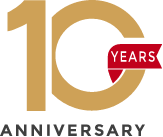


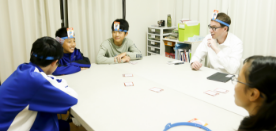
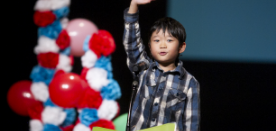
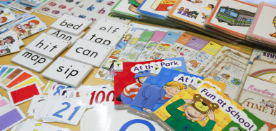
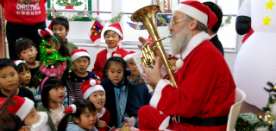
 当校の特徴
当校の特徴
